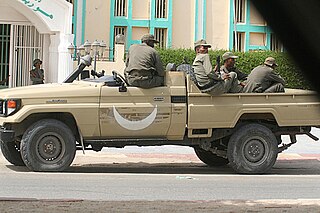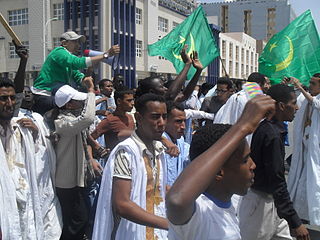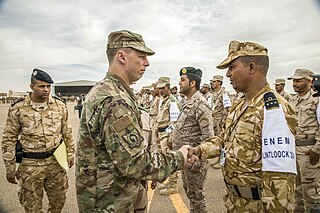| |||||
| Decades: | |||||
|---|---|---|---|---|---|
| See also: | |||||
The following lists events that happened during 2011 in Mauritania .
| |||||
| Decades: | |||||
|---|---|---|---|---|---|
| See also: | |||||
The following lists events that happened during 2011 in Mauritania .
The original inhabitants of Mauritania were the Bafour, presumably a Mande ethnic group, connected to the contemporary Arabized minor social group of Imraguen ("fishermen") on the Atlantic coast.

Mauritania is a presidential democracy, but has suffered from repeated military coups since its Independence in November 1960. For 18 years after independence, Mauritania was a one-party state under Moktar Ould Daddah. This was followed by decades of military rule. The first fully democratic presidential election in Mauritania occurred on 11 March 2007, which marked a transfer from military to civilian rule following the military coup in 2005. The election was won by Sidi Ould Cheikh Abdallahi, who was ousted by another military coup in 2008 and replaced by general Mohamed Ould Abdel Aziz. Mauretania underwent its first peaceful transition of power after the 2019 presidential election, although this was between two presidents of the ruling UPR party and former army generals.

An Islamist insurgency is taking place in the Maghreb region of North Africa, followed on from the end of the Algerian Civil War in 2002. The Algerian militant group Salafist Group for Preaching and Combat (GSPC) allied itself with al-Qaeda to eventually become al-Qaeda in the Islamic Maghreb (AQIM). The Algerian and other Maghreb governments fighting the militants have worked with the United States and the United Kingdom since 2007, when Operation Enduring Freedom – Trans Sahara began.
In December 1984, Haidallah was deposed by Colonel Maaouya Ould Sid'Ahmed Taya, who, while retaining tight military control, relaxed the political climate. Ould Taya moderated Mauritania's previous pro-Algerian stance, and re-established ties with Morocco during the late 1980s. He deepened these ties during the late 1990s and early 2000s as part of Mauritania's drive to attract support from Western states and Western-aligned Arab states. Mauritania has not rescinded its recognition of Polisario's Western Saharan exile government and remains on good terms with Algeria. Its position on the Western Sahara conflict has been, since the 1980s, one of strict neutrality.

The 2008 Mauritanian coup d'état was a military coup that took place in Mauritania on August 6, 2008, when President Sidi Ould Cheikh Abdallahi was ousted from power by the Armed Forces of Mauritania, led by a group of high-ranking generals he had dismissed from office earlier that day.

Mohamed Ould Abdel Aziz is a retired Mauritanian military officer and politician who served as the 8th President of Mauritania from 2009 to 2019.

Mauritania, formally the Islamic Republic of Mauritania, is a sovereign country in Northwest Africa. It is bordered by the Atlantic Ocean to the west, Western Sahara to the north and northwest, Algeria to the northeast, Mali to the east and southeast, and Senegal to the southwest. By land area Mauritania is the 11th-largest country in Africa and 28th-largest in the world; 90% of its territory is in the Sahara. Most of its population of some 4.3 million lives in the temperate south of the country, with roughly a third concentrated in the capital and largest city, Nouakchott, on the Atlantic coast.

Presidential elections were held in Mauritania on 18 July 2009. Mohamed Ould Abdel Aziz, who led the 2008 coup d'état, won a narrow first-round majority in the election, according to official results. A second round, if necessary, would have been held on 1 August 2009.

Ba Mamadou dit Mbaré was a Mauritanian politician who served as President of the Senate of Mauritania from 2006 until his death. As President of the Senate, he succeeded Mohamed Ould Abdel Aziz as Head of State on 15 April 2009, when Abdel Aziz resigned to take part in the June 2009 presidential election. Abdel Aziz was then elected president and in turn succeeded Mbaré on 5 August 2009.

Parliamentary elections were held in Mauritania on 23 November. The opposition has vowed to boycott the election unless the president steps down beforehand. A total of 1,096 candidates have registered to compete for the leadership of 218 local councils across Mauritania, whilst 438 candidates are contesting for the 146 parliamentary seats. Some 1.2 million Mauritanians were eligible to vote in the election. The first round results yielded a landslide victory for the ruling UPR winning 56 seats and their 14 coalition partners winning 34 seats. The Islamist Tewassoul party won 12 seats. The remaining seats were contested in a runoff on 21 December 2013. The UPR won the majority with 75 seats in the Assembly.

The 2011–2012 Mauritanian protests were a series of protests in Mauritania that started in January 2011, influenced by and concurrent with the Arab Spring, and continued into 2012. The mostly peaceful protest movement demanded that President Mohamed Ould Abdel Aziz institute political, economic, and legal reforms. Common themes of protest centered around civil-military relations, slavery, other human rights abuses the opposition accused the government of perpetrating, and economic issues.
Yahya Ould Hademine is a Mauritanian engineer and politician who served as Defense Minister of Mauritania. He served as the Prime Minister of Mauritania from August 21, 2014 to October 29, 2018.
The following lists events that happened during 2012 in Mauritania.
Cannabis in Mauritania is illegal, but the country serves as a major transit point for Moroccan cannabis en route to Europe.

Mohamed Ould Cheikh Mohamed Ahmed Ould Ghazouani, also known as Ghazouani and Ould Ghazouani, is a Mauritanian politician and retired army general who has served as the 9th President of Mauritania since 2019, and the chairperson of the African Union since February 2024.
Ould is an English surname as well as an element of many Arabic names. In Arabic contexts it is a transliteration of the word ولد, meaning "son".

The following lists events in the year 2020 in Mauritania.

Parliamentary elections were held in Mauritania on 13 and 27 May 2023, alongside regional and local elections.

Presidential elections were held in Mauritania on 29 June 2024. Incumbent Mohamed Ould Ghazouani won re-election for his second and final term as president, increasing his vote share by four points.